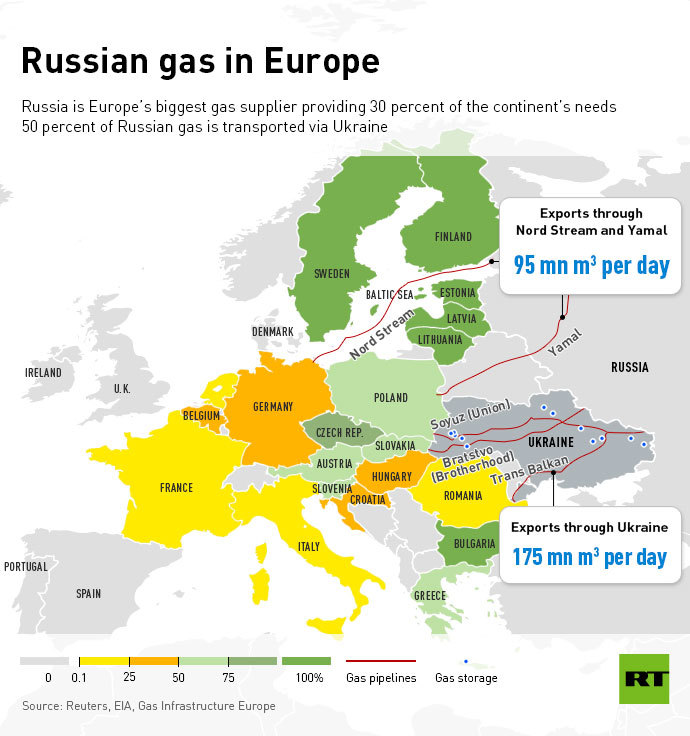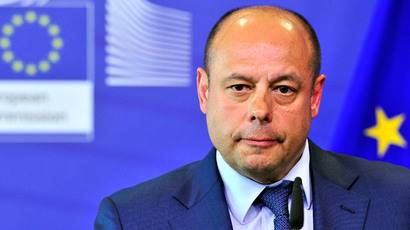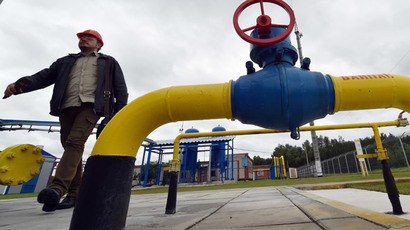Ukraine may block all transit from Russia in sanctions row - PM
Ukraine ready to impose sanctions against any transit via its territory, including air flights and gas supplies to Europe, Prime Minister Arseniy Yatsenyuk said Friday.
Ukraine’s parliament will vote on the final measure on Tuesday, and will take into consideration the country’s Security Service, Valeria Hontareva, president of Ukraine’s Central Bank, said.
Kiev has also prepared a list of 172 Russian citizens and 65 companies predominantly Russian to put under sanctions for “sponsoring terrorism, supporting the annexation of Crimea, and violating the territorial integrity of Ukraine,” Yatsenyuk said at a briefing on Friday.
Proposed sanctions include asset freezes, bans on certain enterprises, bans on privatizing state property, refusing to issue licenses, and a complete or partial ban on transit- both aviation and gas.
“We simply have no other choice,” the Prime Minister said, adding that Ukraine will use part of the planned $17 billion IMF aid to achieve energy independence, and may go to the World Bank for help. The country, which is on the brink of economic default, received the first $3.2 billion tranche in May.
Ukraine wants to “put a stop” to its gas dependence on Russia, its main source for energy to heat homes and buildings, but understands it will not be an “easy” process, Yatsenyuk told reporters.
The Prime Minister estimates Ukraine could stand to lose $7 billion as a result of imposing sectorial sanctions against Russia, its biggest trading partner after the European Union.
“There is no doubt that Russia will continue its course in Ukraine it began a decade ago- banning Ukrainian goods, decreasing cooperation, pressure, and blackmail,” Yatsenyuk said.
On Monday the Ukrainian government said it plans to mirror Western sanctions and target Russia’s financial, energy, and military sectors.
Ukraine imports nearly 50 percent of its natural gas from Russia, which in 2013 totaled 27.7 billion cubic meters of natural gas.
If approved, a halt to Russian gas transit would hit Europe as the continent gets 15 percent of the energy it needs from Russia. In June Gazprom, Russia’s national gas company announced it was stopping deliveries to Ukraine, but would continue to ship 180 billion cubic meters of gas to Europe.

The falling out with Russia’s gas major over pricing and debt has forced Ukraine to cut back on its heavy use of energy. Until the winter, homes will go without hot water to cut gas consumption by 30 percent . In 2013, Ukraine used 55 billion cubic meters, and as it stands, Kiev only has about 1.2 billion cubic meters of gas for heating, ITAR-ITASS reported.
On top of that, Ukraine is also exploring reverse flow options; importing gas from neighboring European countries.
In the event Ukraine cuts off gas transit through its territory, Hungary, Slovakia, and the Czech Republic will suffer, Transneft, Russia's state-owned pipe operator said in a statement on Friday.
Gazprom already has a northern pipeline route that bypasses Ukraine delivering supplies to Germany and other big importers, and is constructing South Stream to run to Southern and Central European countries.
‘Transit ban targeting EU, will increase South Stream support’
The EU will suffer most from the possible gas transit ban by Kiev, especially during the winter months, political analyst at the Berlin Centre for Caspian Region Studies, Matthias Dornfeldt, told RT.
“Hearing this proposal from Prime Minister Yatsenyuk, I was very shocked because Ukraine is targeting more the European Union and the energy security for its eastern member-states than Russia,” he said. “As we saw in 2009, those mostly hit were Slovakia, Bulgaria, and partially other countries.”
However, according to Dornfeldt, “this proposal will never get passed because of the pressure from Brussels...other actors from the international states will stop this proposal.”
Ukraine’s threat to block all transit from Russia “shows the Ukrainian government is not willing to cooperate at all and sees only their own interest,” Dornfeldt argued.
The consequences of such a threat would only increase the EU’s support for Russian projects that involve bypassing Ukraine, such as the South Stream pipeline.
“After hearing this, it is clear that all the states in southeastern Europe – like Austria, Hungary, Serbia, and Bulgaria – will lobby much more for the construction of South Stream to get a very secure supply of gas.”














